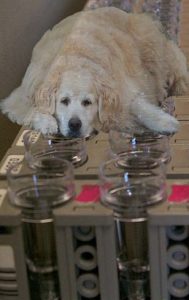
Why Your Dog’s Anti-Thyroid Antibody Test Is Positive
Ron Hines DVM PhD
 See What Normal Blood & Urine Values Are
See What Normal Blood & Urine Values Are
 Causes Of Most Abnormal Blood & Urine Tests
Causes Of Most Abnormal Blood & Urine Tests
Anti-Thyroid Antibodies In Your Pet’s Blood
Your veterinarian can identify most hypothyroid dogs (and the much rarer hypothyroid cat) with a one to three tests: Free T4, T3, and, when required, a TSH stimulation test.
However, a few cases in dogs that your veterinarian might see have all the classic symptoms of hypothyroidism – but they can’t be confirmed with those first three tests alone. Other dogs are checked for the presence of anti-thyroid antibodies because they haven’t responded satisfactorily to a standard veterinary dose of levothyroxine medication.
In some of those dogs – particularly golden retrievers, Shetland and Old English sheepdogs or doberman pinschers – anti-thyroid antibodies that destroy your dog’s own natural thyroid hormone as well as the thyroid supplements you give them are to blame. The anti-thyroid antibody test can help identify those dogs. These anti-thyroid antibodies can be directed against the hormone itself (anti-thyroglobin antibodies) or the thyroid cells that normally produce it. (read here)
In another situation, potential breeding dogs can be screened for genetic susceptibility to this form of hypothyroidism. It is a form of autoimmunity. Elevated anti-thyroid antibody often appears in dogs before actual disease becomes evident and before T3 and T4 levels become subnormal. Hypothyroidism is quite rare in cats, so I cannot tell you much about the test’s use in felines. (read here)
Complementary Tests:
Most likely, a complete thyroid panel would have been run before an anti-thyroid antibody test was suggested. An exception would be dogs being screened for a genetic tendency toward hypothyroidism.
DxMe
You are on the Vetspace animal health website
Visiting the products that you see displayed on this website help pay the cost of keeping these articles on the Internet.

